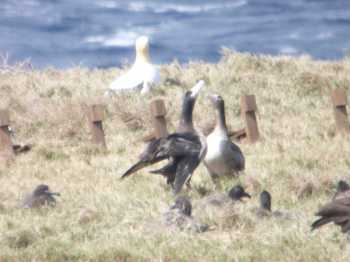With parlous news this month about North Pacific albatrosses dying in their tens of thousands from the effects of the tsunami and for South Atlantic seabirds from a ship running aground and spilling oil around Nightingale Island, it is pleasing to report instead of a continuing success story that may well be destined to result in the establishment of a new breeding colony of Short-tailed Albatrosses Phoebastria albatrus on Japan's Mukojima Island.
Followers of this web site's news will know that each year since 2008 STAL chicks have been taken from Torishima and hand-reared until fledging on Mukojima Island in the Ogasawara (Bonin) Islands.
This year for the first time colour-banded birds from the first cohort of 10 chicks have started returning to the artificial colony as four-year-olds, interacting with the latest batch of chicks and also engaging in courtship displays with one another (including between females).
In the last few days two more"2008-ers" have arrived on the island and been seen displaying and interacting ashore, bringing the numbers of their cohort that have returned to date to four, a rate of 40%. Let's hope more will arrive in time.

Click here to access earlier stories on the translocated albatrosses.
With thanks to Tomohiro Deguchi for information
John Cooper, ACAP Information Officer, 22 March 2011

 English
English  Français
Français  Español
Español